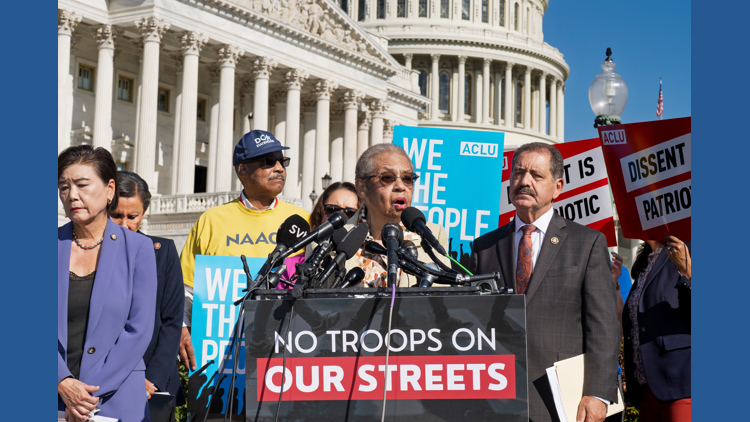
FILE - Del. Eleanor Holmes Norton, D-D.C., center, is joined by Rep. Judy Chu, D-Calif., far left, and Rep. Jesus Garcia, D-Ill., right, at a new conference opposing President Trump's deployment of National Guard troops and federal law enforcement officers to combat crime on the streets of Chicago, Baltimore, and other American cities, at the Capitol in Washington, Sept. 3, 2025. (AP Photo/J. Scott Applewhite, File)
Eleanor Holmes Norton, the long-serving delegate for the District of Columbia in Congress, faces renewed pressure to resign following comments made by former President Donald Trump. Over her 18 terms, Norton has championed the rights and interests of Washington, D.C. residents. However, Trump’s recent remarks have sparked controversy, prompting a wave of calls for her to step down.
Trump, who served as the 45th President of the United States, criticized Norton’s effectiveness in addressing the needs of the district. His comments have reignited debates regarding the representation of the District of Columbia in Congress, a topic that has long been contentious. D.C. residents lack full voting representation in the House of Representatives, a situation Norton has actively sought to change.
The calls for Norton’s resignation reflect broader frustrations among some constituents who feel that their interests are not adequately represented. Critics argue that after nearly two decades of service, the time has come for new leadership that can better advocate for D.C. residents. Norton, who has been a prominent figure in local politics, has not publicly responded to the calls as of yet.
Supporters of Norton point to her long history of advocacy for issues such as voting rights, criminal justice reform, and affordable housing. They argue that her experience and established relationships in Congress are invaluable assets for the district. According to a spokesperson for Norton, she remains committed to her work and is focused on continuing to fight for the rights of D.C. residents.
The debate over D.C. representation has taken on renewed urgency in light of Trump’s remarks. Congressional representation for the district has been a subject of discussion for decades, with various proposals put forth to grant D.C. statehood or enhance its voting rights. Norton has been a leading voice in this ongoing struggle, advocating for changes that would allow residents to have full representation.
As the situation develops, the political landscape in Washington, D.C. may shift significantly depending on the reactions from both constituents and political leaders. Norton’s future in Congress could hinge on the outcome of these discussions, as well as the public’s response to Trump’s intervention.
The issue of congressional representation for the District of Columbia raises important questions about democracy and equality in the United States. Many argue that residents deserve the same rights as those in the 50 states, including the ability to vote for their representatives in Congress. The outcome of this debate may have lasting implications for the political landscape in the capital.
In the coming days, it is expected that public opinion will play a crucial role in shaping Norton’s future. As her constituents voice their concerns, the response from both Norton and the broader political community will be closely watched.







